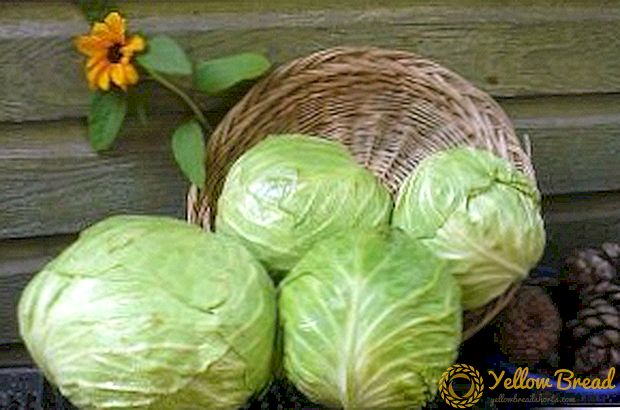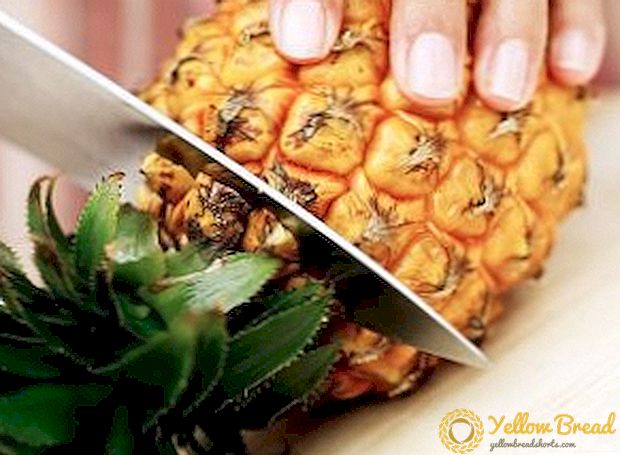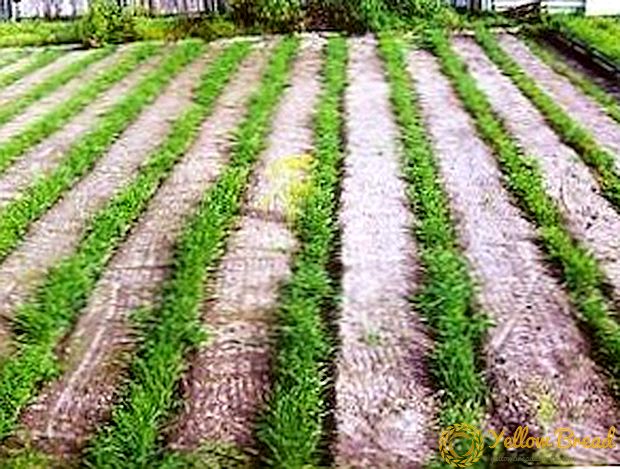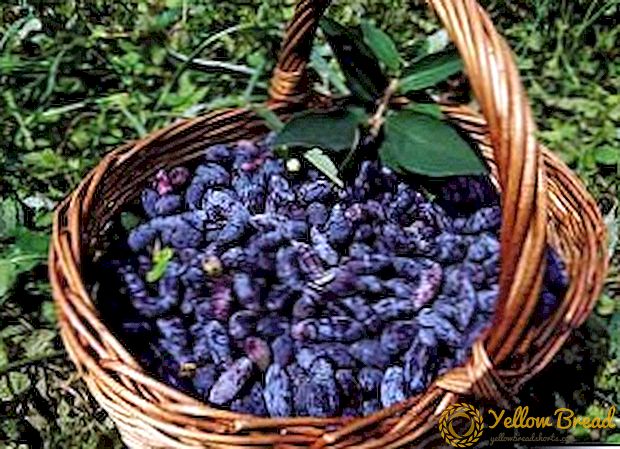
Many gardeners annually grow in their plots the most different varieties of cabbage. Some like color, the second - red, the third - Beijing, the fourth - white. White cabbage Megaton f1 has been grown by cottagers in our country for more than 20 years, since it was included in the state register back in 1996. In this article we will talk about the characteristics of Megaton cabbage, learn how to grow it and how to care for it.
- Characteristics and features
- Advantages and disadvantages of the hybrid
- pros
- Minuses
- Location selection
- Lighting
- The soil
- Predecessors
- Site preparation
- Seed preparation before planting
- Growing seedlings
- Terms for sowing
- Capacity and soil for seedlings
- Sowing seeds: the pattern and depth
- Sprouting conditions
- Sunrise Care
- Dive seedlings
- Hardening seedlings
- Transplanting seedlings to a permanent place
- Timing
- Process and scheme
- Competent care - the key to a good harvest
- Watering, weeding and loosening
- Hilling bushes
- Top dressing
- Harvest
Characteristics and features
This cabbage variety was bred by Dutch breeders from the organization "Bejo Zaden". Megaton is a mid-season variety, crop can collect at 140-160 day after landing. It is possible to grow this vegetable in almost any region of our country, since climatic conditions do not hinder this. The leaves of this variety of cabbage are quite large. They are semi-raised, oval in shape, with a slight wax coating. Leaves are painted in a light green color (coverts are in dark green). Mature fruits reach large sizes, the average weight of a single head of cabbage can be from 3 to 4 kg (there are cases when, with a certain care, there are instances up to 12 kg). Megaton is considered a high-yielding variety of cabbage (the average yield per hectare is 650-850 centners).

Advantages and disadvantages of the hybrid
Like any of the varieties of vegetables, this hybrid has its pros and cons. But it is interesting that the positive qualities are much more than disadvantages.
pros
The positive sides of the hybrid are:
- The minimum size of the stalk in relation to the size of the head itself.
- High taste.
- Resistance to any climate change in our region.
- Heads of almost perfect shape (convenient for long shipments).
- High resistance to some diseases.
Minuses
Most varieties of white cabbage can be stored for 3 to 6 months (subject to optimal storage conditions). However, Megaton lasts from 1 to 3 months, and this is the first disadvantage of this hybrid. The second minus is not so significant (some can easily turn it into a plus): the rigidity of the leaves of a freshly harvested crop.
Location selection
Properly chosen place for planting will contribute to the fact that in 3.5-4.5 months you will be able to harvest a large crop.
Lighting
This variety of cabbage does not tolerate direct hot sunlight, but the constant shadow will not bring anything good. Optimal conditions can be created if every 3-4 rows of cabbage planted sunflowers or corn. These plants will create the partial shade necessary for Megaton.But planting cabbage near high evergreens should not be, as an insufficient amount of lighting, moisture and nutrients will lead to the fact that the yield will fall by 2-3 times.
The soil
Megaton cabbage needs a soil that has good water and air permeability. Sour soil is not suitable for this variety, as the plant can get sick with a keel. The preferred option would be cultivated loam or black soil. If the soil on your site has high acidity, then before planting it should be made a little charcoal to neutralize the acidic environment. It should also be noted that the places that are constantly flooded due to frequent precipitation are bad for planting this vegetable, because the soil there has high humidity. 
Predecessors
It is necessary to select such places for landing, where earlier, for 3-4 years, not grown cruciferous cultures (radishes, cabbage, turnips, etc.) The fact is that a certain kind of plants infect the same pathogenic microorganisms, and in the places of their growth such microorganisms accumulate over the years. Therefore Megaton better to plant in that place, where previously grew potatoes, tomatoes or carrots. Next year, the landing site should be changed again, so you will reduce the risk of various diseases in this hybrid. 
Site preparation
Prepare a plot for planting need to hybrid start in autumn. The soil must be carefully dug, while removing all the weeds, roots, stones and debris. This variety of cabbage likes good feeding, so you need to make fertilizer before the start of winter. Experienced gardeners recommend bringing into the soil rotted manure or humus, which are excellent growth stimulants for Megaton. It is necessary to apply humus at the rate of 10-12 kg per square meter of soil.
Seed preparation before planting
Seedlings are grown in greenhouses, greenhouses or special seedling tanks, which should be placed at home on the windowsill. Pre-hybrid seeds need to harden in order to avoid the risk of various viral diseases. To begin, the seeds are heated in warm water (50 ° C) for 20 minutes, and then put in warm boiled water for another 4-6 minutes. After that, the seeds are processed with special stimulants, which are sold with an insert instruction (use according to the instructions). Biostimulants are different, but the most popular are: Appin, Zircon, Silk, etc.
Growing seedlings
In order to grow healthy seedlings, you need to follow some rules of planting and care. The correct timing and planting technology of seeds are key to success in the seedling business. 
Terms for sowing
In the northern regions of our country, Megaton cabbage needs to be sown on seedlings in mid-April, with the expectation that landing under the open sky will occur in the summer. In the southern regions of Russia and Ukraine, the seeds are planted in early-mid-March, when the outside temperature is already on the street. In regions where winters are relatively warm, it is possible to plant hybrid seeds for seedlings as early as February in order to transplant small seedlings to a permanent place in April.
Capacity and soil for seedlings
Plant cabbage seeds possible in large capacity, greenhouses, greenhouses, peat cups or cassette containers. Some gardeners prefer peat cups, as in them the root system of the seedling develops better, respectively, when transplanting to a permanent place such a seedling will be easier to germinate. However, another part of the gardeners declares that the cassette containers are more convenient, since in them it is much more convenient to take care of the seedlings and dive them. Greenhouse and hothouse methods of growing seedlings will suit those who are going to globally grow Megaton, as there will be much more seedlings in large areas than in small cups or cassettes.But first, a greenhouse or greenhouse needs to be built and all the necessary conditions for seedlings (temperature, humidity, ventilation, etc.) must be created in it.

Sowing seeds: the pattern and depth
There are many ways of sowing cabbage seeds. Some plant seeds with special planters, cover the top with a 2-centimeter layer of earth, and then, after rising the first seedlings, thin them out. The second make separate holes for each seed, so thinning the seedlings in this case is not required.
If you plant seeds in cassettes or cups, then the soil in them must be watered.Watering is necessary until until the water is completely saturated all the soil, after that it is not necessary to moisten the soil until the first seedlings appear. After abundant watering, you need to make holes 1.5-2 cm deep. 3-4 seeds are placed in each well. If more than one sprout appears from one hole, then we leave one (the largest), and tear up the rest. It is necessary to thin the sunrises in such a way that each sprout has 2x2 cm of area.
Sprouting conditions
The correct scheme of planting cabbage Megaton is not the key to full success, so as to seedlings formed a powerful root system, it is necessary to maintain special conditions for germination. First of all, you need to purchase a special fluorescent lamp, which needs to highlight the crops for 14-16 hours a day. You should also create certain temperature conditions up to the appearance of the first sunrises.The sudden changes in temperature will harden the seedlings and contribute to a better survival of the seedlings in a permanent place. In the daytime, the temperature around crops should be at the level of + 18-20 ° С, at night - + 12-15 ° С. 
Sunrise Care
When the first sunrises of seedlings appear, it is necessary ensure good breathability the premises. As many gardeners say, the ventilated room helps to strengthen the aboveground and underground part of Megaton cabbage. Do not forget to monitor the correct temperature and lighting. Watering should occur every 2-3 days with warm boiled water. Once every 8-10 days, several small manganese crystals should be added to the water for irrigation to stimulate growth and enhance the protective reactions of the seedlings.
Dive seedlings
Diving of seedlings should be carried out only when the seedlings have 3 full leaves were formed. Seedlings should be transplanted into separate containers (the distance between the seedlings should be at least 3 cm in row and between rows). But it is best to dive the seedlings into separate peat cups, with which the transfer to a permanent place will take place.When diving, you should observe this rule: a small plant with a clod of earth comes from the cassette, the root is shortened by one third, then the plant is transplanted and a little watered. Each individual plant needs to be buried before the first cotyledon leaves. 
Hardening seedlings
In order for the seedlings to take root successfully at a permanent growth site, it needs to be hardened 2-3 weeks before transplantation. First of all, seedlings should be regularly exposed to the sun (every day for 2-3 hours, gradually increasing the specified time). 2-3 days before disembarking to a permanent place, seedlings should be left for the whole day under the sun.
Transplanting seedlings to a permanent place
The exact timing of the transplant and the correct scheme - the key to success in growing Megaton cabbage. Landing dates for each of the regions of our country will be slightly different, as we will describe below.
Timing
At the beginning of this article we already talked about when to plant the seeds of this mid-season hybrid. For each of the regions of our country landing times are slightly differentrespectively, and the timing of transplantation in open ground will be different. It was decided by a single rule that it is necessary to transplant cabbage seedlings under the open sky when it has reached a height of at least 15 cm, and there are already at least 4 full-fledged leaves on its stem. In the middle zone of the country, seedlings of mid-season cabbage are planted in open ground in early-mid-May, in the northern regions - in late May, in the southern - in mid-April.
Process and scheme
Planting of individual cabbage seedlings is carried out on pre-treated soil.Pit digging at a distance of 50-60 cm, the distance between rows should be about half a meter. Deepen seedlings need to the first sheet, but in no case do not sprinkle it with earth. After all the seedlings are transplanted, it needs to be watered abundantly (water so that at least 20 cm of the soil is soaked with water).
Competent care - the key to a good harvest
If you want to get good and high-quality harvestthen for Megaton cabbage, appropriate care will be required, aimed at timely watering, weeding, loosening, fertilizing, etc.
Watering, weeding and loosening
Watering just transplanted seedlings should be done every 2-3 days (if the weather is hot) or every 5-6 days (if the weather is cloudy).Water the cabbage only necessary in the evening or morningwhen there is no hot sun rays. After 5-6 hours after watering, the soil should be loosened in order to prevent the appearance of a waterproof coma. Loosen the soil to a depth of no more than 5-7 cm, so as not to damage the root system of plants. 
Weeding should be done only when around the cabbage grows "shield" of weeds 5-7 cm high. If the weed grows taller, its roots will be deep in the soil, and it will be harder to weed, as there will be a risk of damaging the roots of cabbage. After loosening and weeding, the soil around Megaton should be mulched with a layer of peat or humus (the thickness of the layer should not exceed 5 cm).
Hilling bushes
Hilling cabbage bushes helps to strengthen the roots of the plant, and also has a positive effect on the quality and quantity of the crop. Hilling needed proto drive after small heads have formed in the cabbage. It is best to spud bushes after rain or heavy watering, after removing the lower leaves (lying on the ground). In the process of hilling between rows of crops need to sprinkle with chopped wood ash.The second hilling is carried out in 2-3 weeks after the end of the first. 
Top dressing
After the cabbage is planted in a permanent place, it must be fed occasionally. When the first leaves began to form, Megaton needs to be fed with nitrogenous fertilizers. It is necessary in 10 liters of water to dilute 10 g of ammonium nitrate. This solution is enough for 5-6 plants. It will be good if for each plant to make 2 liters of the above mixture.
Harvest
Harvesting begins at the moment when night temperature drops to -2 ° C. The main thing is not to miss this period, otherwise you will not be able to keep cabbages for a long time. Dig cabbage bushes along with the roots. Heads that are affected by pests should be used for food as soon as possible, since they will not last long. The rest of the harvest, which is characterized by good shapes and large sizes, can be postponed for preservation. Before laying cabbages for long-term storage, they need to be kept for about a day in air. After that, cut off the roots (but leave 4-5 covering sheets). 
The crop is kept at temperatures of + 4-5 ° С (it is also possible at -1 ° С). Humidity in the storage room should be around 90-98%. Keep the cabbages in a room with good ventilation. Cabbage is put in wooden boxes or hung from a horizontal rope. It is necessary to keep the cabbages in the refrigerator in plastic bags, but this way you shorten its useful life by 1-1.5 months.
Finally, I would like to note that Megaton cabbage is one of the most popular varieties of gardeners in our country. Good yields and unpretentiousness in the care - all that is needed for a modern summer resident.And if you carefully read all the subtleties in planting and care, you will be pleasantly surprised when harvesting.






